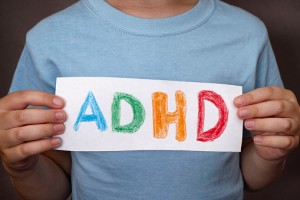Attention deficit hyperactivity disorder (ADHD) tied to higher eating disorders risk
 Attention deficit hyperactivity disorder (ADHD) is tied to a higher risk of eating disorders. Attention deficit hyperactivity disorder is a condition that commonly affects children and can stay with a person right into adulthood. The disorder is characterized by an inability to focus or pay attention, difficulty controlling behavior and hyperactivity.
Attention deficit hyperactivity disorder (ADHD) is tied to a higher risk of eating disorders. Attention deficit hyperactivity disorder is a condition that commonly affects children and can stay with a person right into adulthood. The disorder is characterized by an inability to focus or pay attention, difficulty controlling behavior and hyperactivity.
There are three types of ADHD: predominately hyperactive-impulsive, predominately inattentive, and combined hyperactive-impulsive and inattentive. In predominately hyperactive-impulsive, six or more of the symptoms are part of the hyperactivity-impulsive category. Predominately inattentive children have difficulty getting along with others and they may sit quietly but are not paying attention. In the latter situation parents and teachers may overlook the child and may not realize something is wrong because the child is behaving well, although they are not learning anything. Combined hyperactive-impulsive and inattentive is the most common type of ADHD where symptoms from the two other types are seen.
ADHD tied to higher risk of eating disorder in kids and teens
 Research suggests among kids and teens with ADHD there are higher rates of eating disorders. The specific eating disorder is loss of control eating syndrome (LOC-ES) and it is when a person cannot stop eating even when they want to.
Research suggests among kids and teens with ADHD there are higher rates of eating disorders. The specific eating disorder is loss of control eating syndrome (LOC-ES) and it is when a person cannot stop eating even when they want to.
The study included 79 children between the ages of eight and 14 who were assessed for ADHD and eating disorders. Children with ADHD were 12 times more likely to develop an eating disorder compared to those without ADHD.
Those who were overweight or obese were seven times more likely to have LOC-ES if they had ADHD compared to those without the disorder.
Children who scored higher on impulsivity tests were also more likely to have an eating disorder compared to those with low scores.
Children with ADHD and LOC-ES tend to have more severe forms of ADHD with more impulsive behavior, which is revealed in their eating habits. Other suggestions discuss that both ADHD and LOC-ES share common underlying genetic risk factors, which predispose them to impulsivity.
Study lead, Dr. Shauna Reinblatt, said, “Our findings underscore the need for developing new treatment strategies that could help target disinhibited eating in kids who have both ADHD and LOC-ES.”
The findings were published in the International Journal of Eating Disorders.
Link between ADHD and eating disorders
 Eating disorders are used as a self-medicating technique; those who feel they lack control or feel pain or confusion about their life turn to eating disorders as a means of gaining back control.
Eating disorders are used as a self-medicating technique; those who feel they lack control or feel pain or confusion about their life turn to eating disorders as a means of gaining back control.
Those with ADHD may continuously feel out of control or confused, so food often makes them feel better. Unfortunately, food consumption is only a temporary “high” so then the individual turns to compulsive behaviors.
Compulsive overeaters, bingers and bulimics tend to crave sugary, high-carbohydrate foods. These types of food can actually begin to change the brain’s neurochemistry in a person with ADHD because the brain in an ADHD person is slower to absorb glucose. These types of foods also increase serotonin, which improves anxiety, irritability and depression.
For others, self-starvation is their “medication” to help curtail distractibility, impulsiveness and hyperactivity. They become obsessed with being thin and not eating becomes a way of calming their mind.
It’s important that clinicians dealing with patients with eating disorders consider that ADHD may be the underlying problem and deal with that as well.
Treatment and prevention of ADHD and eating disorders
 When a patient has both ADHD and an eating disorder, it’s empirical that both are treated because only treating one can lead the other existing problem to develop once again. Treating ADHD can help improve focus and attention and can also help the person follow through with treatment for their eating disorder.
When a patient has both ADHD and an eating disorder, it’s empirical that both are treated because only treating one can lead the other existing problem to develop once again. Treating ADHD can help improve focus and attention and can also help the person follow through with treatment for their eating disorder.
Creating a treatment plan for ADHD involves the help of both parents and a doctor to ensure the plan is being followed. Here are some tips to help better treat ADHD.
- Create a schedule – ensure your child sticks to a similar routine daily so they know what to expect.
- Help organize items with your child – work with your child to place items where they belong, like clothing in a closet, toys in a chest, etc.
- Create rules – ADHD children require rules that they can follow so they can continue to focus. Help your child follow the rules by rewarding them when they do.
In adults with ADHD, the following treatments can be beneficial:
- Cognitive and behavioral therapy
- Relaxation training and stress management
- Behavioral coaching for organization
- Job coaching or mentoring
- Family education and therapy
Medications, too, may be prescribed to help treat ADHD. These medications are stimulants, which can help ease symptoms and improve focus. Unfortunately, like many medications, there can be side effects that may impair other areas of health. For example, they may lead to weight gain or even substance abuse.
In order to become successful in treating ADHD, it’s best to speak with your doctor who can help you along the way in regards to medications and even setting you up with a therapist. Combination treatment may a good option; you can work through your disorder with a therapist while calming symptoms with medication.
Know the causes and symptoms of binge eating disorder
We’ve all been tempted by second helpings of a favorite dish, or head to the buffet spread at a restaurant for the third time – you want to get your money’s worth and try everything, right? But what if you felt compelled to wolf down plateful after plateful of food? A dozen donuts or a full bag of cookies? You just kept eating and couldn’t stop. Continue reading…
-
Fat Burning Tips That Work!
Everyday, thousands of people around the world are trying all kind of
-
Tips To Drop The Excess Pounds For Good
Why do you want to lose weight? Are you
-
10 Difficult Stages Of Losing Weight (And Why You Might be Failing)
It happens to all of us.
-
Quick Weight Loss - Weight Loss Review
Are you looking out the ways to lose wei
-
Weight Loss Tricks To Help You Out
If your goal is to shed some of those extra pounds, you have to
-
Is Margarine Now A Heart-Healthy Spread?
Most of us now know that traditional margarine contains trans fats tha
- DON'T MISS
- Fitness Tips For The Working Mother
- Health and Illness Simplified
- Lose Weight Eat More Fiber!
- 3 Weight Loss Myths That Makes Weight Loss A Pain
- Information About How To Lose Weight Fast
- P90X: Home Exercise System to Keep You Fit
- Looking for weight loss? Try Phentermine
- Enhance Your Weight Loss Program With Acai Berry
- Drop Weight Fast With These Proven Guidelines
- Six Diet Tips for Tightening Skin after Weight Loss




